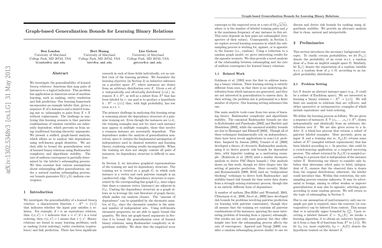Graph-based Generalization Bounds for Learning Binary Relations
We investigate the generalizability of learned binary relations: functions that map pairs of instances to a logical indicator. This problem has application in numerous areas of machine learning, such as ranking, entity resolution and link prediction. Our learning framework incorporates an example labeler that, given a sequence $X$ of $n$ instances and a desired training size $m$, subsamples $m$ pairs from $X \times X$ without replacement. The challenge in analyzing this learning scenario is that pairwise combinations of random variables are inherently dependent, which prevents us from using traditional learning-theoretic arguments. We present a unified, graph-based analysis, which allows us to analyze this dependence using well-known graph identities. We are then able to bound the generalization error of learned binary relations using Rademacher complexity and algorithmic stability. The rate of uniform convergence is partially determined by the labeler's subsampling process. We thus examine how various assumptions about subsampling affect generalization; under a natural random subsampling process, our bounds guarantee $\tilde{O}(1/\sqrt{n})$ uniform convergence.
PDF Abstract

